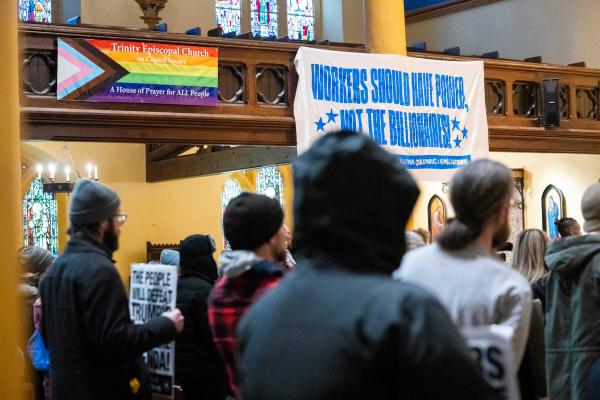Here’s my confession this Advent season: I’m addicted to watching men’s World Cup soccer. Ever since the world’s largest sporting event began last week, my days have started at the painfully early hour of 5 a.m. to catch the first games taking place in Qatar. Watching the games with my two sons, who both play soccer and are now old enough to appreciate the beauty of the sport, only adds to my addiction.
Sadly, this year’s FIFA tournament — the first to be hosted in the Middle East — has been overshadowed by controversies: The migrant workers who built the stadiums and other infrastructure for the tournament did so under frequently dangerous and exploitative labor conditions; one investigation estimated that more than 6,500 migrant workers have died in Qatar since 2010, when the country won its bid to host this year’s World Cup. Then there’s the abysmal human rights record of a nation where homosexuality is an imprisonable crime and women are subject to discriminatory laws. Captains of several European teams announced plans to wear armbands promoting LGBTQ rights, in protest of Qatar’s laws, but the captains abandoned their plans when FIFA threatened them with in-game penalties. On top of all that, there are multiple investigations into whether FIFA officials accepted bribes to vote for Qatar’s selection as the 2022 host.
While these issues are alarming, we must be careful not to apply a moral double standard: The last men’s World Cup was hosted by Russia, a nation that not only launched unjustifiable war against Ukraine earlier this year, but also routinely curtails free speech, discriminates against LGBTQ people, and detains political dissenters. And while we’re pointing the finger at Qatar for its treatment of workers, we should consider our own track record here in the U.S. where migrant farm workers often suffer inhumane conditions and thousands of incarcerated people are forced to work for virtually no pay.
Yet I can’t deny the unbridled excitement that this global phenomenon unleashes every four years. And since this year’s tournament is taking place in November (to avoid Qatar’s crushing summer heat), the international fervor coincides with the start of Advent. Somehow, it all feels fitting: Much like how the 2022 men’s World Cup inspires elation despite the many issues surrounding the tournament, Advent is a season of profound expectation and hope that stubbornly shows up amid very real brokenness.
Here are three ways that watching the men’s World Cup is strengthening my own faith journey this Advent season:
- Hopeful expectation. Advent is a season filled with hopeful anticipation as we await the birth of our savior — it’s the kind of expectation that is the very essence of faith, which is described in the Bible as “the substance of things hoped for, the evidence of things not seen” (Hebrews 11:1). But what does that kind of hope look like? Enter the men’s World Cup: I love how so often the World Cup fills fans with a faith in their team that often transcends any logic or rationality. We hope and believe that our team can defeat any team in the tournament — and sometimes, despite the odds, it comes true, as so many incredible upsets in this year’s tournament attest. In Advent, we are filled with hope in an unlikely savior: a baby born not in a palace, but a manger, upturning so many expectations.
- Exuberant joy. There is something about a goal scored in football (or soccer to Americans) that elicits raw and profound joy and jubilation. Perhaps this is because it is a game in which goals are so hard fought and, in many games, are so rare. This exuberant joy is reflected in the iconic way that so many commentators, particularly from Latin America, announce “GOOOAAALL” with such prolonged gusto. In the face of ongoing inflation, heartbreaking gun violence, the threat and impact of climate change, entrenched political divisions and acrimony, and so much more that is demoralizing; we could all benefit from more moments of unadulterated joy. As Paul reminds us in Romans 15:13 “may the God of hope fill you with all joy and peace in believing.”
- Global solidarity. Few global sporting events bring the world together as much as both the men’s and women’s World Cups. Through the tournament we witness the glorious diversity of the world’s people and cultures, which are so often on display in the stadiums with various chants, rituals, and national attire; while the games often bolster national pride and passion, it’s easy to find ourselves cheering for nations far beyond our own. The tournament serves as a powerful reminder that the entire world is interconnected and is a beneficiary of God’s unconditional and redemptive love — a love that transcends the boundaries of nations. While soccer and other sports have often been coopted and manipulated for political agendas, a shared love of the game also has incredible power to build bridges across deep divisions and serve as a balm amid trying times.
Whether you are a dyed-in-the-wool soccer fan or new to the mania, I hope that in the process of watching and experiencing this men’s World Cup you will also get a taste of the hopeful expectation, exuberant joy, and global solidarity that this Advent and Christmas season has to offer.
Got something to say about what you're reading? We value your feedback!







